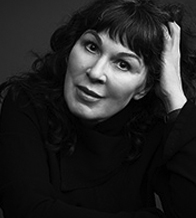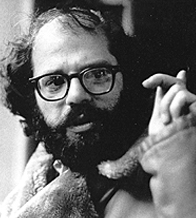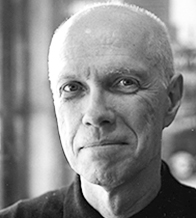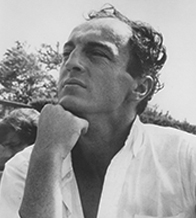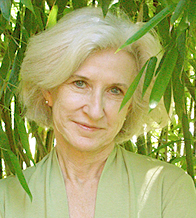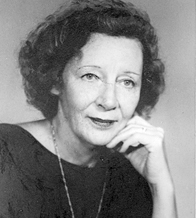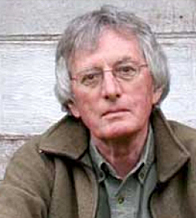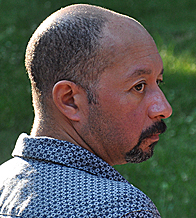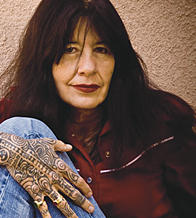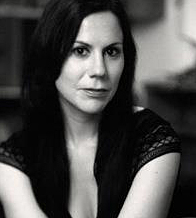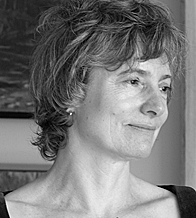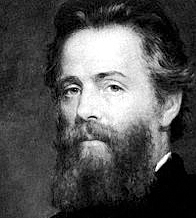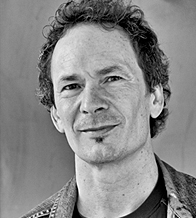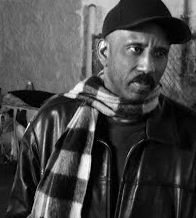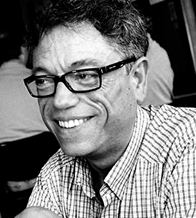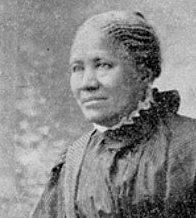A collection of field recordings by a wide range of award-winning contemporary poets. Each poet reads a singular American poem of his or her choosing, and also speaks to how the poem connects, deepens, or re-imagines our sense of the nation. The feature includes a print version of the poem to complement the recording, as well as a piece by the participating poet. The authors are expressing their own opinions in these commentaries, which may not necessarily reflect the position of the Library of Congress.
Mary Jo Bang reads and discusses Allen Ginsberg's “Howl, Part III” - new
“It’s rare that a single event results in permanent social change, and more rare, yet, when that single event is the publication of a poem. ‘Howl’ is one of those few poems.”
Ron Padgett reads and discusses Frank O’Hara’s “A Step Away from Them” - new
“. . . this poem, to me, sounds almost like a letter to a friend: it has a personal tone, it’s conversational, it’s very open and unguarded.”
C.D. Wright reads Besmilr Brigham’s “Heaved from the Earth” - new
“She drives into her poem at an unexpected angle—exits without explanation. She gives the reader ample space to expand and elaborate on her intentions. This is stubborn, backcountry matter—predators and prey.”
James Tate reads Charles Wright's “The Other Side of the River” - new
“ … he seems like he’s locked into some very narrow thing, namely the self, but in truth, it gets very large and wide thanks to his great use of language, and his love of language, and the rhythm …”
Carl Phillips reads and discusses Walt Whitman’s “I Saw in Louisiana A Live-Oak Growing” - new
“And what I am particularly struck by is how, so early in our country’s history, he is making, or trying to make, a space for difference by showing how much we have in common, mainly, the need for love, the need for company and companionship, whoever we are.”
Joy Harjo reads and discusses Jennifer Elise Foerster’s “American Coma” - new
“… in this poem, she’s putting the story of a broken people back together; she’s making a road home, maybe even cleaning the road home for the people, for the person in this story who’s been broken, and for her own brokenness and the brokenness of a whole country.”
Rosanna Warren reads and discusses Herman Melville’s “The March into Virginia” - new
“It’s a poem much concerned with identity: North or South? Youth or age? What is it to be an American? What is it to be living? What is it to be dead? What is it to be ignorant? What is it to be (as the poem says) ‘enlightened?’”
Forrest Gander reads from and discusses Will Alexander’s “The Sri Lankan Loxodrome” - new
“For him, migration is a mode and means of identification with others, and so, of self-discovery.”
D. A. Powell reads Frances E.W. Harper’s “Bury Me in a Free Land” - new
“A tireless suffragist and abolitionist, Harper saw the transformation of this country from a land of inequality to a place of promise and hope.”
Fanny Howe reads and discusses John Wieners’ “The Acts of Youth”
“John Wieners’ poems are the means by which he rescues himself. The poems relieve his anguish as they offer rhythm in the ritual of writing…”
Naomi Shihab Nye reads and discusses Lisa Suhair Majaj’s “Guidelines”
“It reminds me of the power of language to ease situations of potential conflict. Instead of backfiring with fury, the poem gently engages and expands.”
Tony Hoagland reads and discusses Kenneth Patchen’s “The Orange Bears”
“This seems to me to be a beautiful social and political act performed through poetry, which is the act that really lies at the heart of pacifism and our ideas of justice, and reminds us of our right to feel outrage …”
J.D. McClatchy reads and discusses Walt Whitman’s “Drum-Taps”
“The Civil War remains the most cataclysmic and tragic event in our history. Behind the struggle, driving its purpose and passions, loomed the greatest of issues: the fate of a country and the rights of its people.”
Nikky Finney reads and discusses Margaret Walker’s “For My People”
“If I could tell you how much I miss her presence, her courage, her strength, her non-compromising eyes and intellect, I would.”
Amy Gerstler reads and discusses James Tate’s “Wild Beasts”
“America is, as we were all taught in elementary school, a melting pot. There are no countries named in this poem, there are no religious groups named in this poem. The speaker is a kind of everyman . . .”
Gerald Stern reads and discusses Samuel Greenberg’s “The Tusks of Blood”


“The poem, aside from being fascinating and brilliant, perhaps a great poem, is illustrative also, in its way, of the huge wave of immigration coming from southern and eastern Europe at the turn of the last century …”
Marilyn Chin reads and discusses Bessie Smith’s “Backwater Blues”


“The blues poems remind us that the American poetic tradition can be traced to African American oral tradition, that great art, great poems come from deep suffering that is personal, historical, and political …”
Laura Kasischke reads and discusses Randall Jarrell’s “Come to the Stone...”


“Robert Lowell called Randall Jarrell the most heartbreaking poet of our time. I would say that this is his most heartbreaking poem …”
Arthur Sze reads and discusses Walt Whitman’s “Crossing Brooklyn Ferry”

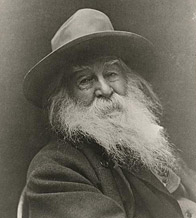
“Whitman’s poem closes the gap between poet and reader. The poet’s speaker asserts his identity through physicality. I, too, received identity by my body and the crowd on the ferry soon becomes everyone who has ever traveled, anyone who has ever gone home, anyone who will ever go home.”
Sharon Olds reads and discusses Lucille Clifton’s “won't you celebrate with me”


“Lucille Clifton: 'Won’t you celebrate with me?’ Yes we will, Lucille. I love this poem.”
Rhina P. Espaillat reads and discusses César Sánchez Beras’ “Areíto por todos”


“Those of us who intermarry know perfectly well that "identity" is not a stable construct but an ongoing process, and that the blood of those who were once "enemies" is now mingled forever with our own.”
Dana Gioia reads and discusses Henry Wadsworth Longfellow’s “The Jewish Cemetery at Newport”


“And the sheer compassion of Longfellow’s vision suffuses the poem with an emotion, an emotional music that is quite powerful. And that is what makes this poem matter most to me personally: the strange beauty and evocative power of its language and its imagery that draw a special resonance from Jewish cultural history.”
Alicia Ostriker reads and discusses Emma Lazarus’ “The New Colossus”


“It is an amazing poem. It claims that we represent, not war and conquest, but freedom, enlightenment, and compassion.”
Charles Harper Webb reads and discusses Richard Garcia’s “El Zapato”


“Just because my mother didn’t throw shoes at me—her weapon of choice was the hairbrush—and wouldn’t have called them zapatos if she had, doesn’t mean I can’t relate.”
Edward Hirsch reads and discusses William Carlos Williams’ “To Elsie”


“So Williams gives us a kind of diagnosis of a situation in America in 1923 (and America afterwards as well), and a kind of solution: we need contact with the earth.”
Rae Armantrout reads and discusses Fanny Howe’s “9/11”


“What happens if we see the deserts of Utah as the same as the deserts of Iraq? We become they, I becomes you, and finally, in the most radical move of all, we all become it.”
Charles Bernstein reads and discusses Charles Reznikoff’s “II. from Amelia”


“He took the legal story of Amelia, which no doubt went on for pages and pages and pages, and he eliminated anything that was not necessary to experience the event.”
Marilyn Nelson reads and discusses Badger Clark’s “A Cowboy’s Prayer”


“. . . this poem expresses a reverence which is evoked by the land. It’s an ecological poem, I suppose one might say . . . one might say it’s a green poem. It’s a poem about loving America as a land. As a landscape.”

